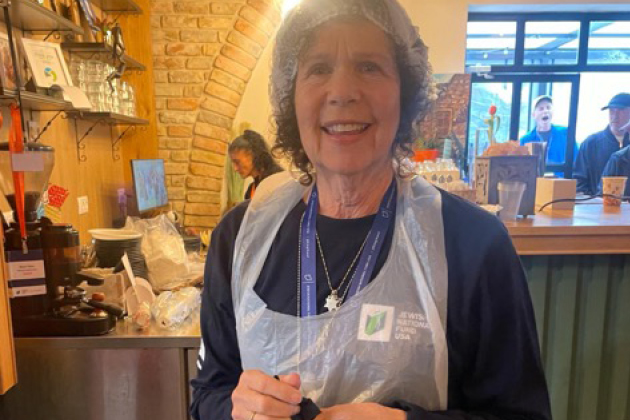I returned home yesterday, March 25, 2024, from a Jewish National Fund-USA Volunteer in Israel Mission Trip. The country is as safe and amazing as ever, but they need help. 80,000 Thai citizens were called back to Thailand leaving a huge gap in farm workers. 120,000 workers from Gaza can no longer come in each day to work on construction sites and warehouses. Along with this situation, 300,000 Israelis are evacuated from their homes, jobs and school. The incredible Israeli government is supporting these displaced citizens, but construction in the country has stopped and farmers are unable to plant, harvest and supply food to the nation. I know you have heard all of this before, but there is something you can do about it. You can go to Israel and help or send more money to support agencies.
There are many programs to help you plan your trip. My trip was with Jewish National Fund-USA. There were 150 volunteers on my program. That is four bus loads. I was on bus 3. Each bus did and went to different jobs. My first day we picked lemons at a farm in the south. Our bus took us there on road 232 along the Gaza corridor. The bullet ridden burned cars were gone. The blood along the road was cleaned up. The bombed landscape was repaired. But the horror still existed and the feeling of pride in a nation that will never give up was present. We filled 23 containers of lemons; 750 pounds in each that day. The farm owner was with us and so appreciative. He told us he would have had to destroy his grove if it was not for local country men/women and foreign volunteers helping to replace all the lost workers.
In subsequent days, we packed Purim boxes for soldiers and delivered them to an army base in the south; attended a talk at Soreko hospital where the October 7 victims were brought in every 89 seconds that day; paid our respects at the Nova music festival site, hostage square in Tel Aviv and an army base in the south where many soldiers were slaughtered; planted broccoli on a farm near Tel Aviv where the new motto is “build and plant”; cooked meals up north in a Druze village for 425 soldiers stationed along the Lebanon border; planted trees at a nature site styled to preserve the biblical landscape; paid our respects at the Kotel ; and talked with the host father of lone soldier Edan Alexander from New Jersey, who was taken hostage in his army uniform.
We were housed at a very nice hotel in Tel Aviv and shared that site with many displaced families who have been there since the war began. Meals were incredible. The tour guides on our buses were exceptional. The security guards were competent. The bus drivers skilled beyond measure. All involved were in some way affected by the war and shared their stories. Psychological services are needed by a majority of the country and the government is stepping up, but severely understaffed. Israel will survive and excel as expected, but will never be the same.
If you want to help Israel, you can go online and find multiple ways to volunteer or donate.


